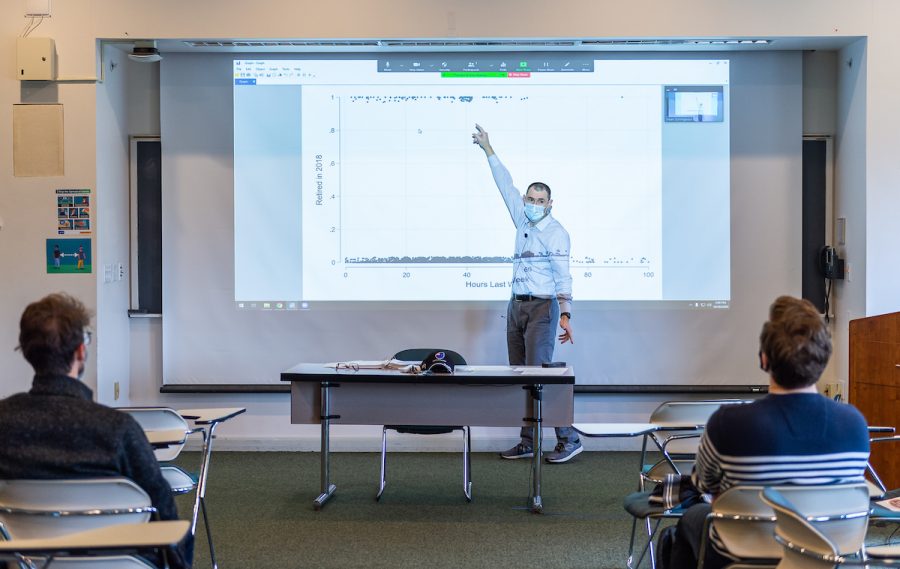Without Consistent Virtual Options, Students Struggle to Learn From Isolation
Without full online class infrastructure, students worry about keeping up with coursework in isolation.
As campus case numbers continue to increase, students in isolation with COVID-19 are facing a challenge not seen last year. Unlike the Fall 2020 and Spring 2021 semesters — when students in quarantine or isolation could attend classes remotely — there is no universal policy for ill students unable to attend in-person classes.
The academic support policy currently in place for students isolating with COVID-19 is the same as is in place for students who might be ill in a non-pandemic year. Interim Provost and Dean of the Faculty Ellen Percy Kraly clarified this protocol, emphasizing the role of the professor.
“As with any student that is ill, that really is up to the faculty member. Faculty have authority over the modality of their teaching, within the context of in-person teaching,” Kraly said.
Professors may have a variety of approaches for students learning from isolation. Kraly added that the course modality may depend on individual student characteristics, the pedagogy of the class and the particular course, as well as the perspectives of the professor.
“There is no universal policy about what happens when a student is sick,” Kraly said. “This is consistent, I think, with Colgate’s principles of confidentiality about health status, but also plays to our better selves in terms of promoting strong interaction and healthy communication between faculty and students.”
After senior Dennis Kennedy’s first arrival test came back positive, he returned home and emailed his administrative dean to figure out how he would learn from isolation. Kennedy’s dean contacted each of his professors to notify them of his situation but instructed Kennedy to also contact them himself. One of his professors responded that there would be no virtual option for the class. Another offered to send videos from the class recorded last semester. Kennedy’s other two professors allowed him to attend the class via Zoom, but one of them forgot to turn the virtual meetings on.
“In a normal week, I’d go to 16 hours of class. Last week I went for 2.5 hours,” Kennedy said. “Thank god it was just the first week. If this was in the middle of the semester, that would actually be a big problem.”
Junior Riley Timken also recounted her transition to learning from isolation.
“Since testing positive for COVID-19, Student Health Services has been incredibly helpful with helping me isolate, monitor my symptoms and reach out to my academic dean. My dean has been an amazing asset thus far and wants me to focus on my health which I am appreciative of,” Timken said. “Adversely, most of my professors have been less than accommodating. They have not offered a way for me to remotely learn, one went as far as to say that I should just get notes from a fellow student without offering me an alternative to have the same or at least comparable learning to my classmates.”
After online learning was used in the Fall 2020 and Spring 2021 semesters for courses that were hybrid or completely online, virtual modes of education may be used on an individual basis, but not as a primary method of instruction, according to Kraly.
“We can certainly have online instruction on a case-by-case basis. For example, for students who are doing independent study it may just be the most efficient way of consultation, and having one-on-one discussion or even office hours,” Kraly said. “But, in terms of going forward with the course delivery or modality or form… we are not accredited to do remote learning as our form of classroom instruction.”
Last spring, Colgate was under emergency circumstances and allowed to use virtual methods of teaching, Kraly clarified. Under the New York State Department of Education, the University still has the ability to use online learning if warranted by circumstances, but it cannot be used as a long-run method of education without an accreditation process.
“We are a residential college, and we believe that in-person instruction is the best way to engage students in the liberal arts,” Kraly said.
Among the students concerned over inaccessibility of remote course access is junior Julia DiTota, who expressed frustration with the lack of uniformity in course policies and overall academic structure from previous semesters.
“This semester is definitely a different situation than the previous two semesters. There isn’t as much overhead structure in terms of how classes should be conducted if students or a professor tests positive for COVID-19,” DiTota said. “Personally, I’ve been experiencing some frustration with figuring out classes — it’s up to each professor now to implement the technology, or not, to include the student in a virtual class session.”
Unlike last year, close contacts are still able to attend their classes. Vaccinated close contacts must wear a mask, monitor symptoms for 14 days and take a test 3–5 days after exposure.
“We don’t have any evidence that this transmission is occurring in classrooms. It is occurring somewhere else amongst Colgate students,” Kraly said. “This kind of movement through the community is to be expected. This idea of going to zero cases or no risk is not a useful concept. We do not have any evidence that transmission is happening within classroom instruction.”
After cases spiked over the weekend, Vice President for Communications Laura Jack announced that masks are required indoors, strongly encouraged grab-and-go dining options and advocated for the avoidance of large indoor gatherings. All of these policies are also in place for the next two weeks.
“I think the Delta variant caught the world by surprise a little bit. I think that — just as a social scientist — we were all so eager to return to normal that those kinds of aspirations took on a life of their own,” Kraly said. “Then Delta came and had very different levels of infectivity when compared to the virus that we had experienced last year.”
Kraly said she and other administrators are watching the data and considering whether they will have to take further action about classroom modalities.
“I think it was the number of cases that reflected testing, in large part, that happened very very quickly,” Kraly said. “We wanted to take a breath and see what was going on. That is where we are right now, during this two-week period of mandatory masking.”
As of 11:59 p.m. on Sept. 6, the Health Analytics Dashboard reported 58 active student cases and two active employee cases.
“There is a lot of looking at the evidence in the context of our own community. I would only ask that students and parents work with us as we learn this new terrain. We are changing our understanding of the pandemic from a response to a killer disease — which it still does kill, no doubt about that, and it does perhaps lead to potential chronic disease. We are moving our perspective to that similar to the flu — it is endemic. We are going to be living with it,” Kraly said. “As we put measures in place and then learn from them, we are building structures that are going to carry us forward. Colgate’s academic programs are moving forward and reflecting this new reality.”

Josie Rozzelle is a senior from San Francisco, CA concentrating in political science with a minor in French. She has previously served as multimedia manager,...





